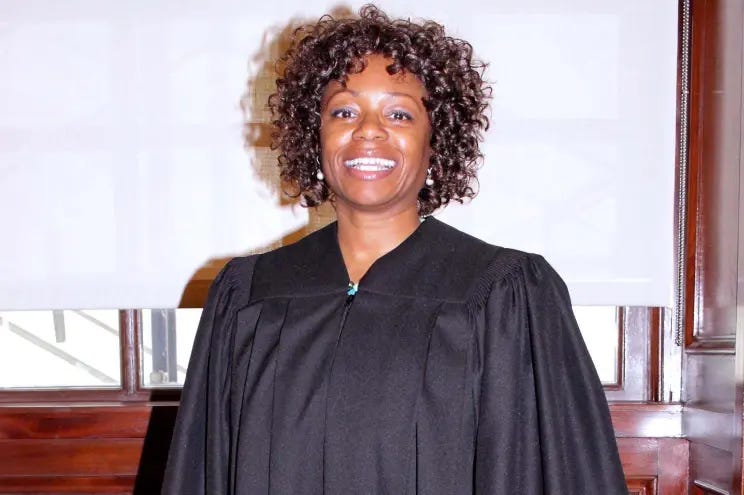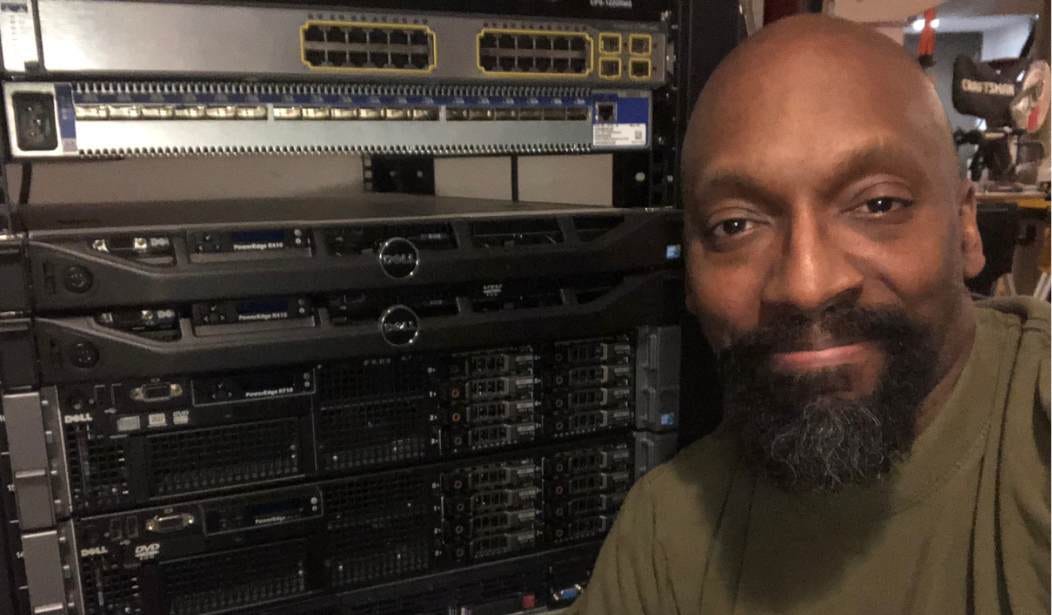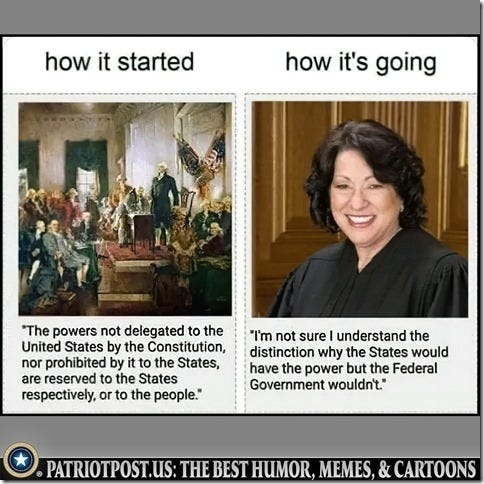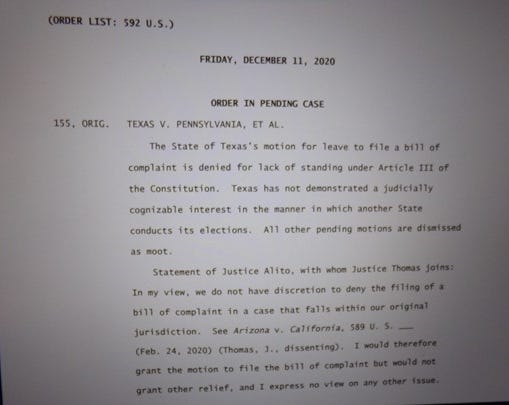America's Judicial Activism Has Gone Off The Rails
The Founders created the Judicial Branch to be the weakest of the three. How did judges go from not only unconstitutionally rewriting legislation but rewriting the actual Constitution itself?
“Do not bring the Second Amendment into this courtroom. It doesn’t exist here. So you can’t argue Second Amendment. This is New York.” - Judge Abena Darkeh

Yes, you read that right! That is what Vinoo Varghese, the defense attorney of 52-year-old Dexter Taylor of Brooklyn was told, when he mentioned the 2nd Amendment regarding charges related to gunsmithing while defending his client. Dexter Taylor, a software engineer, decided to turn his hobby of gunsmithing into a profession and was “legally buying parts from various companies,” which was discovered by a task force. He then got the obligatory ATF SWAT raid. Taylor was convicted last week of 13 weapons charges and can be sentenced from 10 to 18 years. He is being held in Rikers Prison till sentencing because the prosecution argued he was “dangerous,” while other New York defendants that actually brutally assault or have killed people are allowed to go free!
More outrageous!
Attorney Varghese believed the only chance of having the case go in his client’s favor was through jury nullification.
Jury nullification is legal, although Judge Darkeh “attempted to shut down his argument and led the jury to believe they would face consequences if they did not vote to convict Taylor.”
“She basically said, ‘You must vote guilty’ without saying, ‘You must vote guilty,’” he continued.
Varghese also commented that Judge Darkeh was “the most aggressive prosecutor in the room.”
Article VI, Clause 2, U.S. Constitution, Supremacy Clause
This Constitution, and the Laws of the United States which shall be made in Pursuance thereof; and all Treaties made, or which shall be made, under the Authority of the United States, shall be the supreme Law of the Land; and the Judges in every State shall be bound thereby, any Thing in the Constitution or Laws of any State to the Contrary notwithstanding.
The Founders on the Judicial Branch
The Founders who created the Constitution and the government it controls would not even recognize what America has become since their day. Congress has been creating agencies that it no longer controls and are unconstitutionally allowed to create “rules”, (laws), for “We the People.” Even more preposterous that the weakest branch, the Judicial, would become all powerful ruling the Executive and Legislative!
Alexander Hamilton, author of Federalist 78, was one who felt the Judicial Branch would be the least dangerous of the three branches:
Whoever attentively considers the different departments of power must perceive, that in a government in which they are separated from each other, the judiciary, from the nature of its functions, will always be the least dangerous to the political rights of the constitution; because it will be least in a capacity to annoy or injure them. The executive not only dispenses the honors, but holds the sword of the community. The legislature not only commands the purse, but prescribes the rules by which the duties and rights of every citizen are to be regulated. The judiciary on the contrary has no influence over either the sword or the purse, no direction either of the strength or of the wealth of the society, and can take no active resolution whatever. It may truly be said to have neither force nor will, but merely judgment; and must ultimately depend upon the aid of the executive arm even for the efficacy of its judgments.
As opposed to Thomas Jefferson:
If [as the Federalists say] “the judiciary is the last resort in relation to the other departments of the government,” … , then indeed is our Constitution a complete felo de so. … The Constitution, on this hypothesis, is a mere thing of wax in the hands of the judiciary, which they may twist and shape into any form they may please. - Thomas Jefferson, Letter to Judge Spencer Roane, Nov. 1819
You seem to consider the judges the ultimate arbiters of all constitutional questions; a very dangerous doctrine indeed, and one which would place us under the despotism of an oligarchy. - Thomas Jefferson, Letter to Mr. Jarvis, Sept, 1820
The judiciary of the United States is the subtle corps of sappers and miners constantly working underground to undermine our Constitution from a co-ordinate of a general and special government to a general supreme one alone. This will lay all things at their feet. … I will say, that “against this every man should raise his voice,” and, more, should uplift his arm … - Thomas Jefferson, Letter to Thomas Ritchie, Sept. 1820
Do you get the impression Thomas Jefferson was very alarmed about the potential power of the judiciary?
Unfortunately, every one of his fears have come true!
Regarding the Supreme Court, we have horrifically come to a point where the majority of nine appointed people have more power than all the rest of elected and appointed government officials at the federal, state and local level combined! Most outrageous, more power than “We the People” who created the Judicial Branch in the first place!
Judicial Activism:
The practice in the judiciary of protecting or expanding individual rights through decisions that depart from established precedent or are independent of or in opposition to supposed constitutional or legislative intent.
From the Heritage Foundation:
Courts have an essential constitutional role of policing the structural limits on government and neutrally interpreting the law.
Judicial activism occurs when judges decide cases based on their personal preferences and in spite of the text of the Constitution, statutes and applicable precedent
Judges are not charged with deciding whether a law leads to good or bad results, but with whether it violates the Constitution.
Article III of the Constitution:
Section 1
The judicial Power of the United States shall be vested in one supreme Court, and in such inferior Courts as the Congress may from time to time ordain and establish. The Judges, both of the supreme and inferior Courts, shall hold their Offices during good Behaviour, and shall, at stated Times, receive for their Services, a Compensation, which shall not be diminished during their Continuance in Office.
Section 2
The judicial Power shall extend to all Cases, in Law and Equity, arising under this Constitution, the Laws of the United States, and Treaties made, or which shall be made, under their Authority;—to all Cases affecting Ambassadors, other public Ministers and Consuls;—to all Cases of admiralty and maritime Jurisdiction;—to Controversies to which the United States shall be a Party;—to Controversies between two or more States;—between a State and Citizens of another State,—between Citizens of different States,—between Citizens of the same State claiming Lands under Grants of different States, and between a State, or the Citizens thereof, and foreign States, Citizens or Subjects.
In all Cases affecting Ambassadors, other public Ministers and Consuls, and those in which a State shall be Party, the supreme Court shall have original Jurisdiction. In all the other Cases before mentioned, the supreme Court shall have appellate Jurisdiction, both as to Law and Fact, with such Exceptions, and under such Regulations as the Congress shall make.
The Trial of all Crimes, except in Cases of Impeachment, shall be by Jury; and such Trial shall be held in the State where the said Crimes shall have been committed; but when not committed within any State, the Trial shall be at such Place or Places as the Congress may by Law have directed.
Section 3
Treason against the United States, shall consist only in levying War against them, or in adhering to their Enemies, giving them Aid and Comfort. No Person shall be convicted of Treason unless on the Testimony of two Witnesses to the same overt Act, or on Confession in open Court.
The Congress shall have Power to declare the Punishment of Treason, but no Attainder of Treason shall work Corruption of Blood, or Forfeiture except during the Life of the Person attainted.
Modern Examples of Judicial Activism:
As per Article III, Section 2, the Supreme Court is ordered to hear “Controversies between two or more States;” They refused to hear the case Texas v Pennsylvania, with 17 other states joining with Texas. The basic argument:
Whether the Supreme Court should temporarily prevent Georgia, Michigan, Pennsylvania and Wisconsin from certifying their 2020 election results because changes to those states' election procedures in light of the COVID-19 pandemic violated the Constitution.
The court came to a decision without even having a hearing or producing a signed order from any judge, claiming Texas and the other 17 states that signed on, weren't harmed by was was done in Pennsylvania, Georgia, Michigan and Wisconsin.
How is any court order valid or enforceable without a judge’s signature? Try enforcing a custody order, divorce decree, etc., without a judge's signature! I am open to comments…
The reality of the argument:
“In the context of a Presidential Election,” state actions “implicate a uniquely important national interest,” because the impact of the votes cast in each State is affected by votes cast in other states.” - Anderson v. Cellebrezze, 460 U.S. 780, 794 - 95 (1983)
For the President and the Vice President of the United States are the only elected officials who represent all the voters in the nation.
“Every voter” in a federal election, “has a right under the Constitution to have his vote fairly counted without it being distorted by fraudulently cast votes.” - Anderson v. United States, 417 U.S. 211, 227 (1974) - (These are exerpts from the Amicus Brief filed by the State of Missouri in Texas v. Pennsylvania)
Legislators in each state as per the Constitution control election law and elections. Encroachment on state legislators by other state officials actually changing election laws days before and right up to the election violates the separation of powers and threatens individual liberty.
Chief Justice John Roberts personally committed two egregious acts of judicial activism when he saved Obamacare by actually rewriting the legislation from the bench:
In the court's 2012 decision in NFIB v. Sebelius, the chief justice recognized that the law's individual mandate requiring people to buy health insurance was unconstitutional. But this couldn't be right, because allowing the uninsured to free ride on taxpayers would not "improve health insurance markets." So, through a "saving construction," the chief justice rewrote the mandate as a "tax" and upheld the law, completely obliterating the boundaries of the role of the Judicial Branch in the Constitution!
In King v. Burwell, the chief justice found that the "plain meaning" of the text — that "state" means "state" — was a "strong" argument. But this couldn't be right, because limiting subsidies to state exchanges would not "improve health insurance markets." So, once again, the chief justice rewrote the law, this time to provide subsidies everywhere.
The first judicial activism of the Supreme Court:
The Supreme Court has committed judicial activism practically from the start, stepping outside their narrow Constitutional boundaries, using each precedent to build on the next, like the proverbial camel's nose under the tent:
Marbury v. Madison (1803) - The first act of judicial activism.
References in History.com, Britannica.com etc., will tell you the Supreme Court "created" judicial review when in actuality, the Supreme Court was forbidden to "create" anything at all, let alone the authority to oversee the actions of the Legislative and Executive branches. Yet the Supreme Court determined it had the power to decide cases concerning the Constitutionality of Congressional or Executive actions and when it deemed them unconstitutional, can overturn them! When Chief Justice Marshal ruled Section 13 of the 1789 Judicial Act violated Article III Section 2 of the Constitution, he is the one who actually violated the Constitution by going outside his Article III boundaries!
Thomas Jefferson, of the Republican party, (NOT the Democrat/Republican party) beat John Adams of the Federalist party in a Presidential election so brutal and mean spirited they would not speak again for many years. Marbury was a Justice of the Peace named by Adams in his rush to pack the courts with Federalists that did not have his commission signed off by the previous Secretary of State, John Marshall. Now President Jefferson directed his Secretary of State, James Madison not to seat Marbury. Marbury ran to his friend, now Chief Justice Marshall, and filed a suit. Marshall and Jefferson were bitter rivals and Marshall came up with an ingenious and devious unconstitutional solution.
Courts make rulings using precedents from past judgements and are really reluctant to change course, even if the precedents are egregiously wrong. For example, Roe v Wade took 50 years to overturn.
This usurpation of judicial authority continues down to the “inferior courts.” The Supreme court is the only one equal to the Executive and Legislative Branches, as per Article III, Section 1. All other courts are inferior and were created by the Legislative Branch, which makes it even more outrageous when inferior court judges think they can utter the magic spell “it's unconstitutional” without even a basis, and actually think they have the power to arbitrarily declare an action by the Congress or the President "unconstitutional". And utterly contemptible to overturn votes by " We the People", who created the Judicial Branch in the first place!
Nothing in the Constitution has given [the judges] a right to decide for the Executive, more than to the Executive to decide for them. Both magistrates are equally independent in the sphere of action assigned to them. - Thomas Jefferson to Abigail Adams, 1804. ME ll:50
Each of the three departments has equally the right to decide for itself what is its duty under the Constitution without regard to what the others may have decided for themselves under a similar question. - Thomas Jefferson to Spencer Roane, 1819. ME 15:215
More egregious judicial activism:
Roe v. Wade - Denied “Life, Liberty and the Pursuit of Happiness” to 63,459,781 babies by bizarrely “finding” a “right to privacy” in the 14th Amendment while ignoring the clearly written part in the 14th Amendment:
No State shall make or enforce any law which shall abridge the privileges or immunities of citizens of the United States; nor shall any State deprive any person of life, liberty, or property, without due process of law; nor deny to any person within its jurisdiction the equal protection of the laws.
Dred Scott- Ruled black Americans were not citizens and didn't have equal protection under the law.
Plessy v. Ferguson - States could permissibly exercise their police power to enforce segregation as a matter of public policy.
Buck v. Bell - Permitted compulsory sterilization.
Korematsu v. United States - Confining law abiding Japanese Americans to internment camps was Constitutional.
Kelo v. City of New London - Twisted the Takings Clause of the 5th Amendment which allows condemnation of private property for public use into condemning private property for commercial use!
A bizarre new judicial activism:
Apparently, bizarrely and unconstitutionally, some judges on the Supreme Court of the United States who “solemnly swear (or affirm) that I will support and defend the Constitution of the United States against all enemies, foreign and domestic; that I will bear true faith and allegiance to the same;” feel they need to look to Constitutions and laws from other countries to make rulings.
Justice Ruth Bader Ginsburg:
The U.S. Supreme Court did not have the “same readiness to look beyond our shores” as other nations.
Nor does the U.S. Supreme Court note the laws or decisions of other nations with frequency.
Justice Sandra Day O'Connor:
Nevertheless, I think American judges and lawyers can benefit from broadening our horizons. I know from my experience at the Supreme Court that we often have much to learn from other jurisdictions.
There are many others who feel the same way!
There are numerous examples of Judicial Activism past and present. An excellent book on the history of the Supreme Court and its excesses is "Men in Black: How the Supreme Court Is Destroying America”, by Mark Levin. How they tweaked the Constitution to find “a right to privacy” in the 14th Amendment, come up with the most unconstitutional conclusions, such as Roe v Wade. How they figuratively re-wrote the Constitution to include the phrase "Separation of Church and State". How one justice was so senile all he did was sit in his office and watch the soap opera, "Days of Our Lives", while his staff did all the work are some examples. Also, how supremely qualified judges, for political reasons, were ruined out of selection like Judge Robert Bork, hence the phrase "getting Borked". How Clarence Thomas was demonized in an attempt to keep him off the bench by bringing in Anita Hill who created utterly bizarre stories. Incidentally, Joe Biden was behind the scenes BOTH times!
To be fair, judges at the Supreme Court level and inferior courts don't just go berserk one day, become activists and decide to make rulings using "social justice" instead of justice as per the Constitution. The Executive Branch unconstitutionally chooses them that way and the Congress unconstitutionally approves them. Then we have judicial choices based on filling quotas. Black, gay, transgender, etc. Biden SPECIFICALLY said he would appoint a black woman to the Supreme court, narrowing potential qualified candidates by 99%! A black woman who couldn't or wouldn't define what a woman is.
Next: Did the Supreme Court play a major part in destroying morality in America?
America belongs to “We the People.” It does not belong to Congress. It does not belong to special interest groups. It does not belong to the courts. It belongs to “We the People.” - John Jay, First Chief Supreme Court Justice, 1789 -1795





BLM judges who benefited from affirmative action and not merit. Clearly they missed the coursework on constitutional law.
S0r0s rewriting how we use our laws?
https://onlinecoursesblog.hillsdale.edu/totalitarianism-a-new-name-for-an-old-thing/